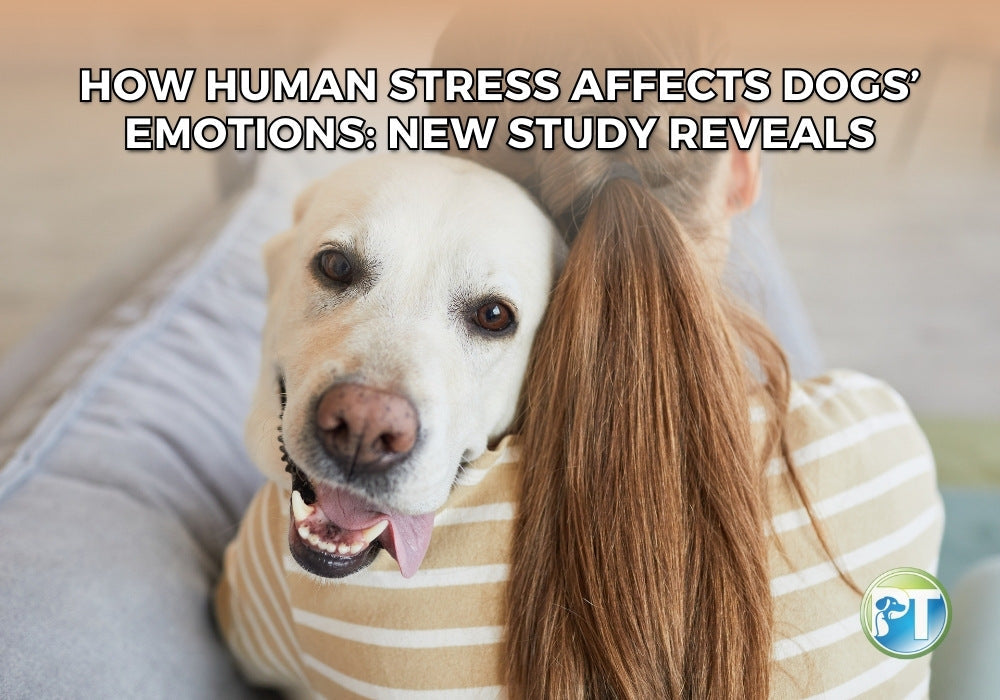How Human Stress Affects Dogs’ Emotions: Study Reveals Surprising Insights

Dogs have an incredible ability to sense human emotions, whether it’s joy, sadness, or stress. A recent study from the University of Bristol reveals that human stress doesn’t just affect dogs emotionally but also impacts their decision-making. The findings suggest dogs experience “emotional contagion” through the smell of human stress, leading them to make more pessimistic choices.
What is Emotional Contagion?
Emotional contagion, the transfer of emotions between individuals, is a well-known phenomenon in humans. The new research demonstrates that dogs can also experience this, particularly through scent. The strong bond between humans and dogs highlights the interconnectedness of their emotional states.

Study Overview: Dogs’ Response to Human Stress
The University of Bristol conducted a study to examine whether the smell of human stress could alter dogs' emotional states and learning abilities. Eighteen dogs and their owners participated in trials involving different human odors, from stressed and relaxed individuals.
Using a test designed to assess "optimism" and "pessimism" in animals, researchers trained the dogs to differentiate between two bowl locations. In one location, the bowl always contained a treat, while in the other location, the bowl was always empty. After the dogs learned these positions, they were tested by presenting ambiguous locations between the two.
The speed at which a dog approached the ambiguous bowl location was used as a marker of their emotional state. A quicker approach indicated optimism, as the dog expected to find food. In contrast, a slower approach indicated pessimism, suggesting the dog believed the bowl would likely be empty.
Stress Smell Increases Pessimism in Dogs
Dogs exposed to the smell of stressed humans approached ambiguous bowls more slowly, showing signs of pessimism. On the other hand, dogs exposed to the scent of relaxed humans did not display the same hesitation. Researchers concluded that the smell of human stress induced a negative emotional state in dogs, influencing them to make more cautious decisions.
Why Dogs Might React This Way
The researchers believe dogs may respond pessimistically to stress odors as a survival mechanism. By lowering their expectations, dogs may conserve energy and avoid potential disappointment, especially when uncertainty is present. The presence of human stress signals might also alert them to potential dangers or threats in their environment.

Implications for Dog Owners and Trainers
For dog owners and trainers, the implications of this study are significant. If dogs are affected by the scent of human stress, it could influence how they behave in everyday situations and training sessions. Dog trainers, in particular, should be mindful of their emotional state when working with dogs, as their stress could impact a dog’s overall performance.
Special Considerations for Dogs in High-Stress Environments

In high-stress environments like kennels or shelters, dogs may need special attention to avoid absorbing human stress. The study shows that reducing stress is important in environments where dogs face constant exposure to multiple people and stimuli. Dogs are sensitive to the emotions of those around them, making stress management crucial for their emotional well-being.
Practical Tips for Dog Owners
There are a few ways to help manage stress and improve your dogs’ emotional health:
- Be Mindful of Your Own Stress Levels: Your stress can influence your dog’s behavior and mood. Practice stress-relief techniques like meditation or deep breathing, especially around your dog.
- Create a Calming Environment: Ensure your dog has a safe, quiet space (such as a crate) to retreat to during chaotic times. A calm environment helps reduce stress for both you and your dog.
- Engage in Positive Interactions: Spend time with your dog in a positive way – through play, walks, or training sessions. This strengthens your bond and promotes emotional stability.
- Routine Relaxation: Incorporate relaxing activities, such as calm walks or gentle massage, into your dog’s daily routine to keep stress levels low.
- Observe Stress Signals in Your Dog: Be attentive to signs of stress in your dog, such as pacing, panting, or changes in behavior. Address these signs quickly by eliminating stressors when possible.
Final Word
This study provides new insight into how closely linked human and dog emotions are. Dogs are not only emotionally intelligent but also highly influenced by human stress through scent. For dog owners and trainers, managing stress is essential to maintaining the dog’s emotional health. By fostering a positive environment, both humans and dogs can enjoy better emotional well-being and a stronger bond.
You might also enjoy...
-
Posted in
Pet News


